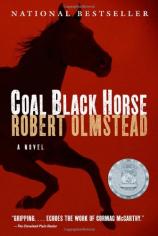Reading Group Guide
Discussion Questions
Coal Black Horse

1. Why do you think Robey’s mother sends him on a dangerous journey to find his father? How do you feel about her decision?
2. Robey is reminded of his mother as he travels. For example, when he is shot: “He was in pain and his mother always said that pain was weakness leaving the body” (page 53). Where else in the story do you find her presence? How would you characterize their relationship?
3. In what ways does the landscape at the farm, on the road, on the battlefield, and in Gettysburg inform the story and affect Robey and the people around him?
4. In his travels Robey sees a lot of strange, beautiful, and gruesome things. For example, the horse skeleton covered with vines and flowers (page 26) and then the description of the man’s skeleton a few pages later (page 29). What other examples of this juxtaposition can you find? How do they affect how you understand Robey’s journey?
5. Robey meets so many characters on the road—Morphew, the German, the upside-down boy, the goose man, the major, the pregnant woman in the graveyard, the scavenger brothers. How do these secondary characters help (or impair) Robey’s quest to find his father?
6. What role do fate and second sight play in the novel? For example, Robey’s mother knows that Thomas Jackson has died without being told and that Robey must find his father before July. What other examples can you find, and how do fate and premonition guide your own life?
7. Morphew tells Robey that he is “in for an education” (page 21). After a battle later in the story, Robey has this encounter with the coal black horse (page 112): “Then he urged the horse on and it hesitated before responding as if to acknowledge that its rider had learned some valuable lesson and should be rewarded for such.” What is Robey learning? How does he acknowledge his education?
8. Throughout the course of the novel Robey has to make hard decisions such as stealing food and horses. How does he feel about these decisions? In what ways do they seem to change him?
9. Robey doesn’t kill the man who rapes Rachel even though he has the opportunity and cause to do so. Why doesn’t he?
10. Religion plays a significant role over the course of the story, perhaps most dramatically in this revelation on page 116: “He decided from that day forever after that there must live a heartless God to let such despair be visited on the earth, or as his father said, a God too tired and no longer capable of doing the work required of him.” How do religion and spirituality shape the novel?
11. Pages 124–26 describe the scavengers and minor businesses that spring up in the wake of battle. How does Robey seem to feel about this? How does this affect your perception of the Civil War?
12. The pregnant woman in the graveyard tells Robey that “people should be born twice: once as they are and once as they are not” (page 130). What does she mean by this? How does this tie into the themes of the novel?
13. How would you describe Robey’s relationship with his mother, the coal black horse, his father, and Rachel? How is each relationship different and alike? And how do these relationships define Robey as a boy and Robey as a man?
14. War has affected the land and the people—for example, the “raggedy old woman with a sun-stained and stroketwisted face” (page 178). To what extent have the characters, the land, and even the animals been affected by the ravages of of war?
15. How does the birth of the twins change Robey? How does it change Rachel? Do you have the sense that things will be better or worse for the family? Why?
16. How has Robey’s story altered the way you think about war and violence? Has it made you think about love and faith differently? Are there particular passages that reflect your opinions and feelings?
Coal Black Horse
- Publication Date: April 25, 2008
- Paperback: 229 pages
- Publisher: Algonquin Books
- ISBN-10: 1565126017
- ISBN-13: 9781565126015








